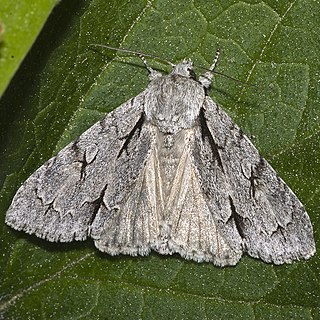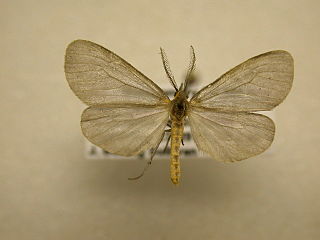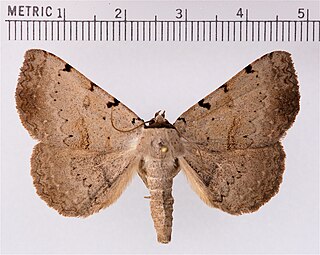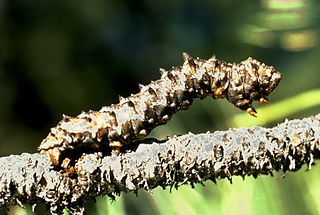
Acronicta is a genus of noctuid moths containing about 150 species distributed mainly in the temperate Holarctic, with some in adjacent subtropical regions. The genus was erected by Carl Linnaeus in his 1758 10th edition of Systema Naturae. Caterpillars of most Acronicta species are unmistakable, with brightly colored hairy spikes, and often feed quite visibly on common foliate trees. The hairy spikes may contain poison, which cause itchy, painful, swollen rash in humans on contact. The larva of the smeared dagger moth is unusually hairy even for this genus. Acronicta species are generally known as dagger moths, as most have one or more black dagger-shaped markings on their forewing uppersides. But some species have a conspicuous dark ring marking instead.

Pagara is a monotypic moth genus in the family Erebidae. Its only species, Pagara simplex, the mouse-colored lichen moth, is found in North America, where it has been recorded from Alabama, Arkansas, Florida, Georgia, Illinois, Indiana, Iowa, Kansas, Kentucky, Maryland, Mississippi, New Hampshire, North Carolina, Ohio, Oklahoma, South Carolina and Tennessee. Both the genus and species were described by Francis Walker in 1856.
Pygoctenucha is a genus of moths in the family Erebidae. The genus was erected by Augustus Radcliffe Grote in 1883.
Trocodima is a genus of moths in the family Erebidae. The genus was described by Watson in 1980.
Afotella is a monotypic moth genus of the family Noctuidae erected by William Barnes and Foster Hendrickson Benjamin in 1926. Its only species, Afotella cylindrica, was first described by Augustus Radcliffe Grote in 1880. It is found in western North America from Saskatchewan and Alberta south to California.

Alypia is a genus of moths in the family Noctuidae.

Copivaleria is a monotypic moth genus of the family Noctuidae erected by Augustus Radcliffe Grote in 1883. Its only species, Copivaleria grotei, or Grote's sallow, was first described by Herbert Knowles Morrison in 1874. It is found in eastern North America, including Ontario, Tennessee, New York and Maryland.

Zanclognatha is a genus of litter moths of the family Erebidae. The genus was erected by Julius Lederer in 1857.
Zelicodes is a monotypic moth genus in the family Erebidae. Its only species, Zelicodes linearis, is known from the US state of Arizona. Both the genus and species were first described by Augustus Radcliffe Grote, the genus in 1896 and the species in 1883.

Isogona is a genus of moths of the family Erebidae. The genus was erected by Achille Guenée in 1852.

Gabara is a genus of moths in the family Erebidae. The genus was erected by Francis Walker in 1866.
Melanomma auricinctaria, the gold-lined melanomma moth, is the only species in the monotypic moth genus Melanomma of the family Erebidae. It is found in the United States and Canada. Both the genus and species were first described by Augustus Radcliffe Grote in 1875.

Prosoparia is a genus of moths of the family Erebidae. The genus was erected by Augustus Radcliffe Grote in 1883.

Ptichodis is a genus of moths in the family Erebidae. The genus was erected by Jacob Hübner in 1818.

Spiloloma is a monotypic moth genus in the family Erebidae. Its only species, Spiloloma lunilinea, the moon-lined moth, is found in eastern and south-central North America. Both the genus and species were first described by Augustus Radcliffe Grote in 1873.
Toxonprucha is a genus of moths in the family Erebidae described by Heinrich Benno Möschler in 1890.
Cyclica is a monotypic moth genus in the family Geometridae. Its only species, Cyclica frondaria, is found in the US states of Arizona, New Mexico and Texas. Both the genus and species were first described by Augustus Radcliffe Grote in 1882.
Spargaloma is a monotypic moth genus in the family Erebidae. Its only species is Spargaloma sexpunctata, the six-spotted gray. Both the genus and species were first described by Augustus Radcliffe Grote in 1873. It is found from coast to coast in lower Canada south in the east to Florida, Mississippi and Arkansas, in the west to California.

Phaeoura mexicanaria is a species of moth of the family Geometridae first described by Augustus Radcliffe Grote in 1883. It is found in North America, including British Columbia, California, Texas and Washington.
Inopsis funerea is a moth of the family Erebidae. It was described by Augustus Radcliffe Grote in 1883. It is found in North America, where it has been recorded from Arizona and South Carolina.











